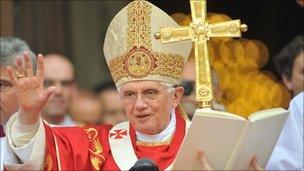MPs query £1.85m overseas aid spent on Pope visit
- Published

MPs have asked ministers to explain why £1.85m ($3m) from the international development budget was spent on the Pope's UK visit in September.
They queried the "surprising" transfer from the Department for International Development (Dfid) to the Foreign Office and what it was spent on.
Dfid said the cash would not affect overseas aid spending as it was taken from its "running costs" budget.
But Labour said an equivalent sum should be returned to Dfid.
The part of Dfid's budget used to pay for staffing and administration costs is not ringfenced from spending cuts - unlike core overseas development aid which is protected from the budget squeeze across government.
The coalition has pledged to giving 0.7% of gross national income as overseas aid by 2013 but Labour is questioning whether this will happen.
Annual accounts
Pope Benedict's four-day visit in September was estimated at the time to have cost Whitehall departments £10m. Roman Catholic churchgoers also contributed to the costs of the visit.
MPs on the international development select committee said they were surprised to discover the transfer of £1.85m while examining Dfid's annual accounts, money the committee said was "supposed to be for overseas development aid".
"Many people will be as surprised as we were to discover that UK aid money was used to fund the Pope's visit last year," its chairman, Liberal MP Malcolm Bruce, said.
"Ministers need to explain exactly what this was spent on and how it tallies with our commitments on overseas aid."
The committee also warned that a commitment to send more UK aid to war-torn and fragile states would make it more difficult to keep track of how the money was being spent, and meant less would go to some poor countries where it could achieve more.
Mr Bruce said the committee supported the government's aim to focus on fragile states - which made up the bulk of those countries furthest from achieving the Millennium Development Goals to tackle global poverty.
But he added: "War-torn or fragile states are inevitably more vulnerable to corruption and maladministration."
'Historic commitment'
A Dfid spokesman said the department was one of several which part-funded the Pope's visit.
He added: "Our contribution recognised the Catholic Church's role as a major provider of health and education services in developing countries.
"This money does not constitute official development assistance and is therefore additional to the coalition government's historic commitment to meet the 0.7% UN aid target from 2013.
"The committee acknowledges that we are right to focus on conflict-ridden countries, home to some of the world's poorest people."
Labour said the Foreign Office should return the money to the Department for International Development.
The government "shouldn't be siphoning off Dfid funds to subsidise Foreign Office expenditure on state visits", said Harriet Harman, the party's deputy leader and international development spokeswoman.
"Dfid money should be to tackle poverty and global inequality, not to support Foreign Office diplomacy."
- Published9 November 2010
- Published19 September 2010
- Published19 September 2010